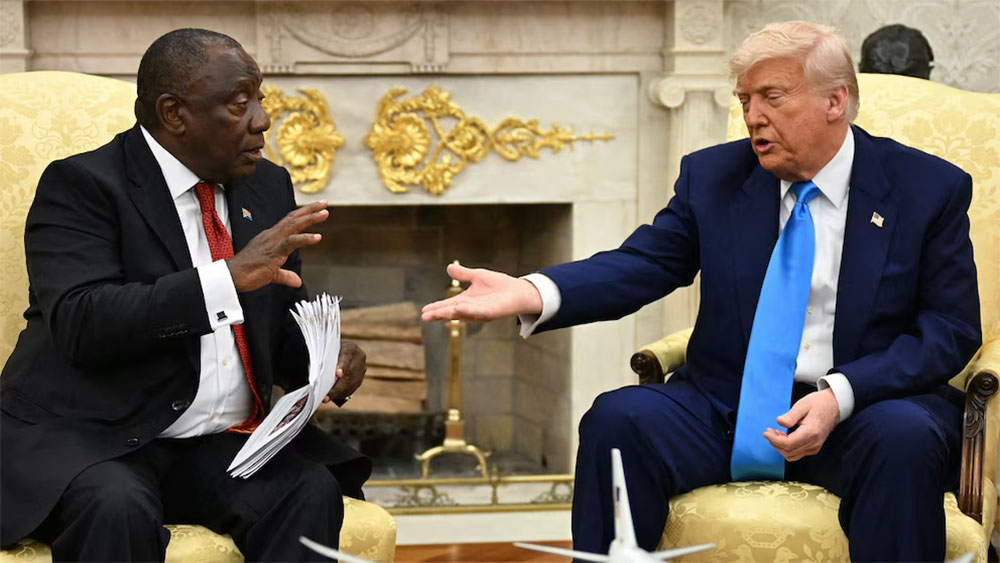Photo Credit: Getty Images
What began as a diplomatic reset between the United States and South Africa quickly deteriorated into a heated confrontation as President Donald Trump blindsided his counterpart with widely discredited allegations of white genocide. The Wednesday meeting at the White House exposed deep fractures in bilateral relations, transforming what should have been routine diplomacy into an uncomfortable spectacle.
President Cyril Ramaphosa arrived at the White House hoping to repair strained ties following recent tensions. South African exports face a crushing 30% tariff once Trump's import tax pause expires in July. Ramaphosa brought famous golfers Ernie Els and Retief Goosen, along with billionaire Johann Rupert, as part of his charm offensive. He even gifted Trump an elaborate book showcasing South Africa's premier golf courses.
The atmosphere shifted dramatically when Trump dimmed the Oval Office lights for a video presentation. The footage featured opposition leader Julius Malema chanting inflammatory rhetoric about shooting Afrikaners, followed by images of crosses that Trump claimed marked burial sites of murdered white farmers. "The farmers are not black. I don't say that's good or bad, but the farmers are not black," Trump declared during the presentation.
Trump handed Ramaphosa printed articles about alleged attacks on white South Africans, demanding an "explanation" for claims of systematic persecution. The crosses shown in the video were not actual graves but symbolic displays from a 2020 protest following a farming couple's murder in KwaZulu-Natal province. Organizers confirmed they represented farmers killed over multiple years, not specific burial sites.
Recent U.S. acceptance of 59 white South African refugees had already inflamed tensions between the nations. Ramaphosa previously called these asylum seekers "cowards" for abandoning their homeland. In February, Trump suspended critical aid to South Africa and expelled Ambassador Ebrahim Rasool after accusations of promoting "white supremacism."
Ramaphosa maintained composure throughout Trump's accusations, systematically dismantling each claim. "What you saw - the speeches that were made... that is not government policy," he explained regarding Malema's inflammatory rhetoric. "We have a multiparty democracy in South Africa that allows people to express themselves." He emphasized that Malema's party represents a small minority with no governmental authority.
Statistics contradict Trump's genocide allegations entirely. Between October and December 2024, nearly 10,000 people were murdered in South Africa. Among farm attacks during this period, only one actual farmer died, alongside five farm dwellers and four employees who were likely black. A South African judge dismissed genocide claims as "clearly imagined" and "not real" when ruling on an inheritance case involving white supremacist groups.
"If there was a genocide, these three gentlemen would not be here," Ramaphosa stated, gesturing to his white delegation members. Agriculture Minister John Steenhuisen, who is white, confirmed that most farmers prefer remaining in South Africa despite challenges. The controversial land expropriation law signed by Ramaphosa allows government seizure of private property only when deemed "equitable and in the public interest."
Patrick Gaspard, former U.S. ambassador to South Africa under Barack Obama, called the meeting "truly embarrassing." He suggested Trump deliberately set a trap to humiliate the South African president and damage the country's reputation internationally. Malema mocked the confrontation afterward, describing it as "older men meeting in Washington to gossip about me."
The heated exchange highlighted broader geopolitical tensions stemming from South Africa's genocide case against Israel at the International Court of Justice. Trump's administration views this legal action as hostile to American interests in the Middle East. These diplomatic wounds continue festering as both nations struggle to find common ground.
Despite Trump's aggressive approach, Ramaphosa avoided escalating the confrontation into a shouting match, unlike Ukrainian President Volodymyr Zelensky's February meeting in the same Oval Office. The South African leader repeatedly attempted redirecting conversation toward trade and economic cooperation, which he called the "real reason" for their diplomatic engagement.
The contentious meeting underscores how misinformation can poison international relations when political leaders embrace unsubstantiated claims over factual evidence and diplomatic protocol.


